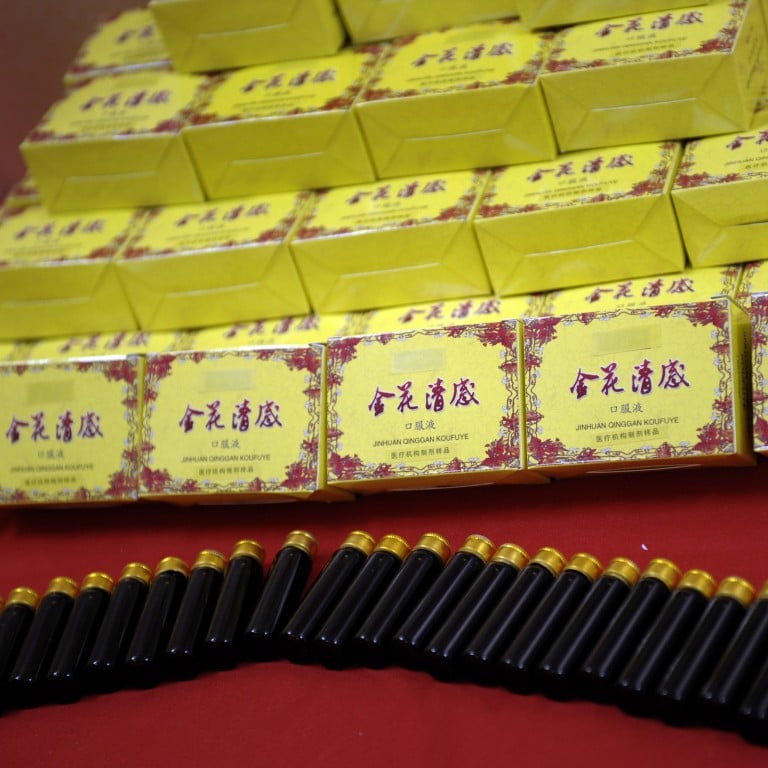
Traditional Chinese medicine effective in treating mild Covid-19 cases, overseas study finds
- Clinical trial conducted in Pakistan using Jinhua Qinggan granules, recommended for use in mainland China’s treatment of the disease, found a shorter recovery time
- But researchers acknowledge that patients with severe underlying medical conditions were not included in study
An overseas clinical trial suggests that Jinhua Qinggan granules, a traditional Chinese medicine, are effective in treating mild cases of Covid-19, according to a study published earlier this week.
The paper posted on medRxiv, an online publisher of preliminary medical research findings, said a trial in August involving 300 volunteers at a Pakistani hospital showed it was effective in treating mild presentations of the disease.
The study’s participants, all adult Pakistanis with mild symptoms, were randomly assigned to receive either 5g of Jinhua Qinggan or placebo granules three times daily for 10 days. The participants were divided into two groups of 150. In total 256 patients completed the study, 129 taking Jinhua Qinggan and 127 the placebo.
Treatment using Jinhua Qinggan showed greater clinical efficacy at 82.67 per cent after 10 days, compared with the placebo group at 10.74 per cent, the researchers found.
Jinhua Qinggan, sometimes known as JHQG, comprises 12 ingredients including honeysuckle, Baikal skullcap root and sweet wormwood herb.
The median time to recover from Covid-19-related symptoms including cough, sputum, sore throat, dyspnea, headache, nasal obstruction, fatigue, and myalgia was “shorter in the JHQG group” compared with the placebo group, the researchers said.
The study was carried out by a multinational team hailing from the University of Karachi and the Indus Hospital in Karachi; the Chinese University of Hong Kong (Shenzhen); Baptist University’s School of Chinese Medicine of Hong Kong; and the Beijing Hospital of Traditional Chinese Medicine at Capital Medical University.
But the team acknowledged that study did not include patients afflicted with severe underlying medical conditions, a group that faces a higher risk of Covid-19 disease progression.
CanSino makes it three for Chinese Covid-19 vaccines to get WHO nod
The research forms part of Beijing’s effort to prove to the international community how effective TCM can be in treating Covid-19. TCM has been widely used in mainland China to treat Covid-19, often in combination with Western medicine.
Nearly 80 per cent of them are in stable condition after TCM treatment and are finally discharged from hospitals following recovery
The WHO has strongly recommended Paxlovid by Pfizer to treat Covid-19. While Beijing has approved the orally administered drug for domestic use, it is hoping to see breakthroughs in developing its own oral drug for the disease.
On Wednesday, the first clinical study of China’s antiviral oral drug against Omicron – VV116 – was published in the journal Emerging Microbes and Infections.
The researchers said VV116 could effectively treat patients infected with the Omicron variant who have mild symptoms in the early stages. However, the drug would need to be administered within the first five days of infection.
VV116 is an oral anti-Sars-CoV-2 nucleoside candidate jointly developed by the Shanghai Institute of Materia Medica of the Chinese Academy of Sciences and the Wuhan Institute of Virology. The drug has been approved for treating Covid-19 in Uzbekistan and is being studied in several phase 3 clinical trials involving patients with the disease.
Conducted in March, the study involved hospitalised Covid-19 patients. Most had mild symptoms, and 89 per cent had been vaccinated with one or more doses. In the VV116 group, participants received 300mg of VV116 orally every 12 hours for five days.
The results showed that the 60 patients who received VV116 within five days of their first positive test had a shorter viral shedding time than the 76 members of the control group. Those in the VV116 group spent an average of 8.56 days to test negative for Covid-19, in contrast with 11.13 days for the control group. No serious adverse reactions were reported in either group.

